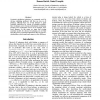Free Online Productivity Tools
i2Speak
i2Symbol
i2OCR
iTex2Img
iWeb2Print
iWeb2Shot
i2Type
iPdf2Split
iPdf2Merge
i2Bopomofo
i2Arabic
i2Style
i2Image
i2PDF
iLatex2Rtf
Sci2ools
137
click to vote
FLAIRS
2008
2008
Reformulating Constraint Models for Classical Planning
Constraint satisfaction techniques are commonly used for solving scheduling problems, still they are rare in AI planning. Although there are several attempts to apply constraint satisfaction for solving AI planning problems, these techniques never became predominant in planning; and they never reached the success of, for example, SATbased planners. In this paper we argue that existing constraint models for classical AI planning are not fully using the power of constraint satisfaction; thus we propose a reformulation, which significantly improves their efficiency.
AI Planning | Artificial Intelligence | Constraint Satisfaction | Constraint Satisfaction Techniques | FLAIRS 2008 |
Related Content
| Added | 02 Oct 2010 |
| Updated | 02 Oct 2010 |
| Type | Conference |
| Year | 2008 |
| Where | FLAIRS |
| Authors | Roman Barták, Daniel Toropila |
Comments (0)

